Organisational Behaviour: Culture, Motivation, Team Dynamics Report
VerifiedAdded on 2023/06/18
|13
|3268
|118
Report
AI Summary
This report provides an analysis of organisational behaviour within the context of Dare Studio, a British design award-winning company. It examines the influence of organisational culture, politics, and power on individual and team behaviour and performance. The report evaluates process and content theories of motivation, including Maslow's hierarchy and Vroom's expectancy theory. Furthermore, it explores the characteristics of effective versus ineffective teams, utilizing models like Tuckman's stages of team development and Belbin's team roles. The analysis provides insights into how these concepts impact the company's overall performance and offers practical applications for improving team dynamics and employee motivation within the organisation.
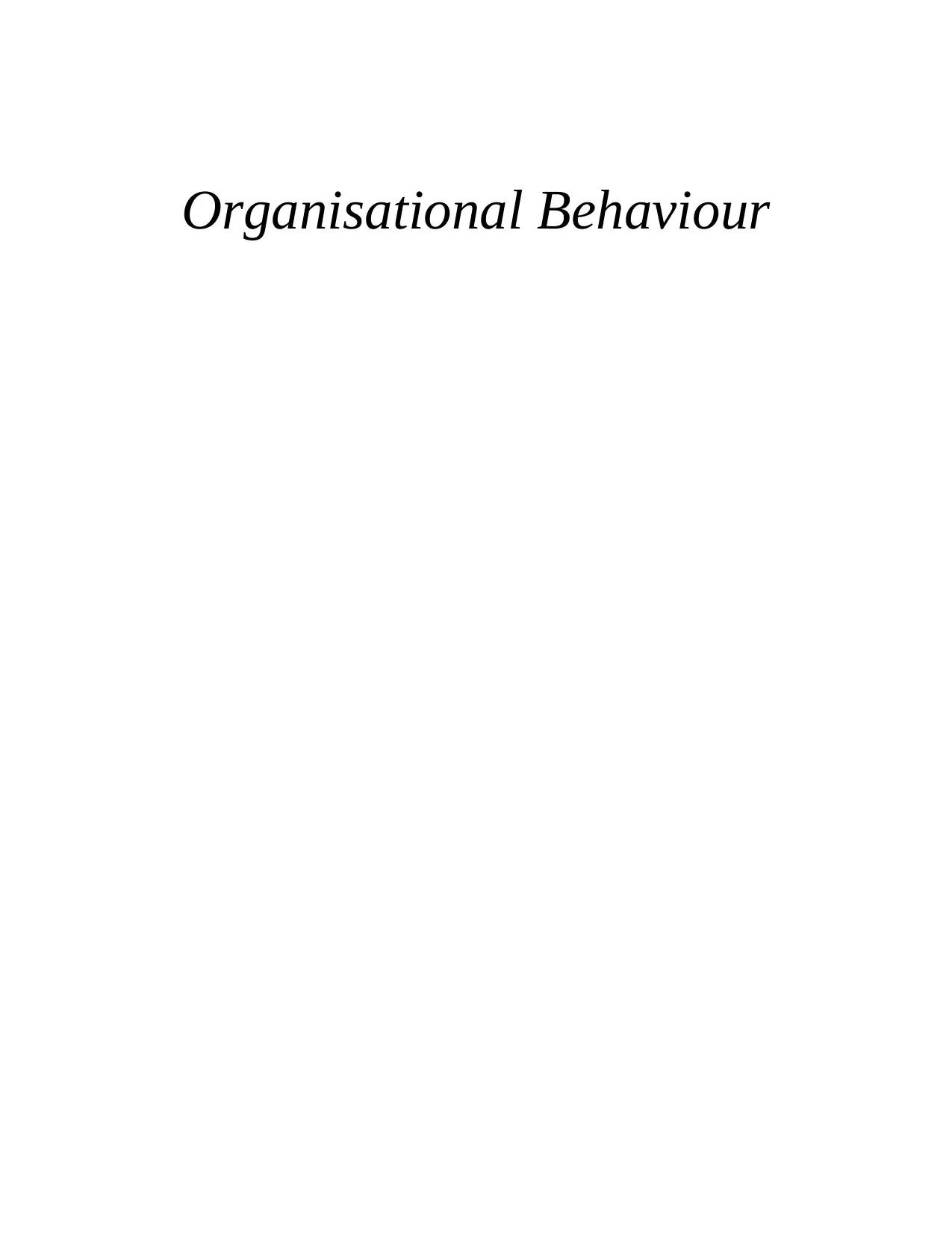
Organisational Behaviour
Paraphrase This Document
Need a fresh take? Get an instant paraphrase of this document with our AI Paraphraser
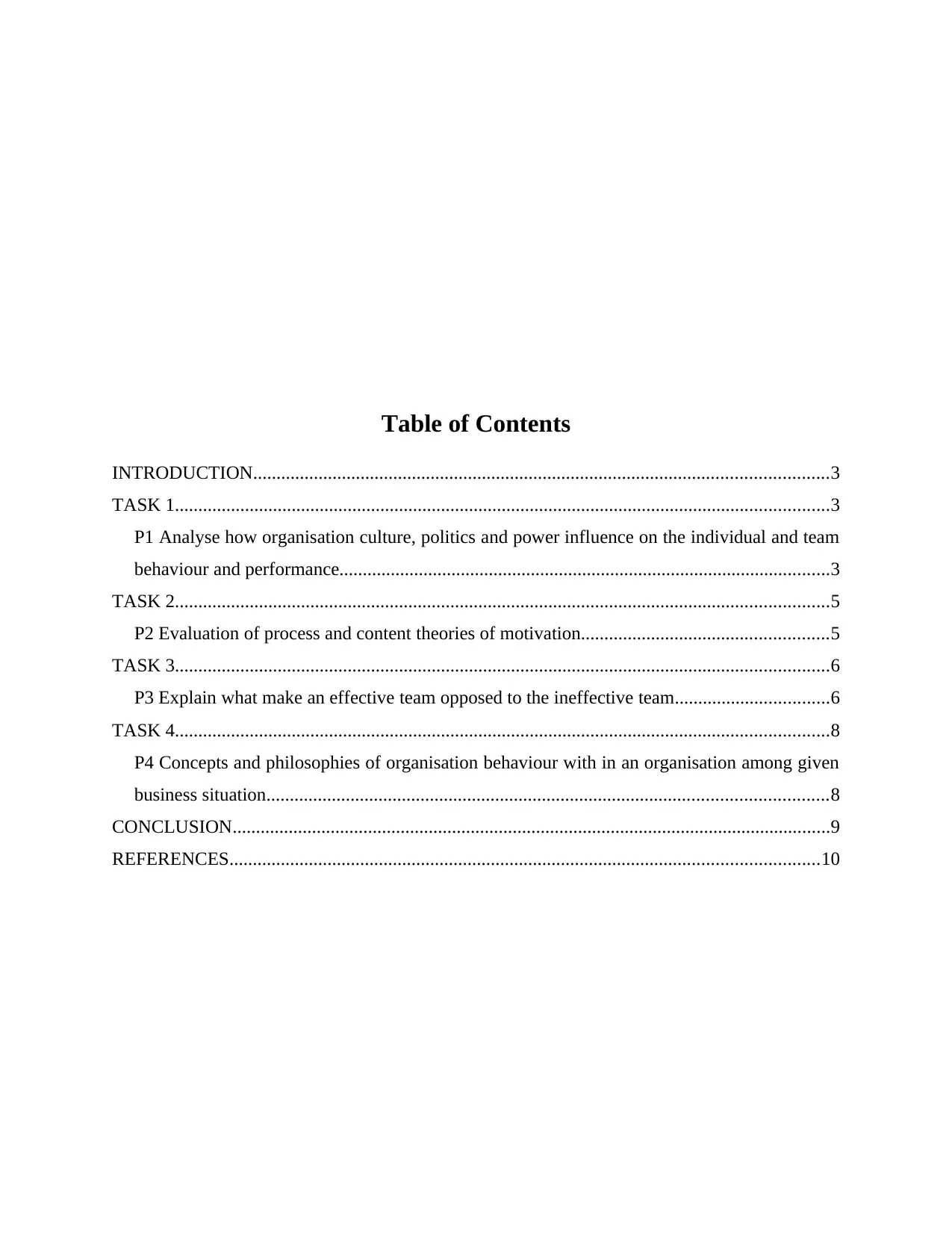
Table of Contents
INTRODUCTION...........................................................................................................................3
TASK 1............................................................................................................................................3
P1 Analyse how organisation culture, politics and power influence on the individual and team
behaviour and performance.........................................................................................................3
TASK 2............................................................................................................................................5
P2 Evaluation of process and content theories of motivation.....................................................5
TASK 3............................................................................................................................................6
P3 Explain what make an effective team opposed to the ineffective team.................................6
TASK 4............................................................................................................................................8
P4 Concepts and philosophies of organisation behaviour with in an organisation among given
business situation........................................................................................................................8
CONCLUSION................................................................................................................................9
REFERENCES..............................................................................................................................10
INTRODUCTION...........................................................................................................................3
TASK 1............................................................................................................................................3
P1 Analyse how organisation culture, politics and power influence on the individual and team
behaviour and performance.........................................................................................................3
TASK 2............................................................................................................................................5
P2 Evaluation of process and content theories of motivation.....................................................5
TASK 3............................................................................................................................................6
P3 Explain what make an effective team opposed to the ineffective team.................................6
TASK 4............................................................................................................................................8
P4 Concepts and philosophies of organisation behaviour with in an organisation among given
business situation........................................................................................................................8
CONCLUSION................................................................................................................................9
REFERENCES..............................................................................................................................10

⊘ This is a preview!⊘
Do you want full access?
Subscribe today to unlock all pages.

Trusted by 1+ million students worldwide
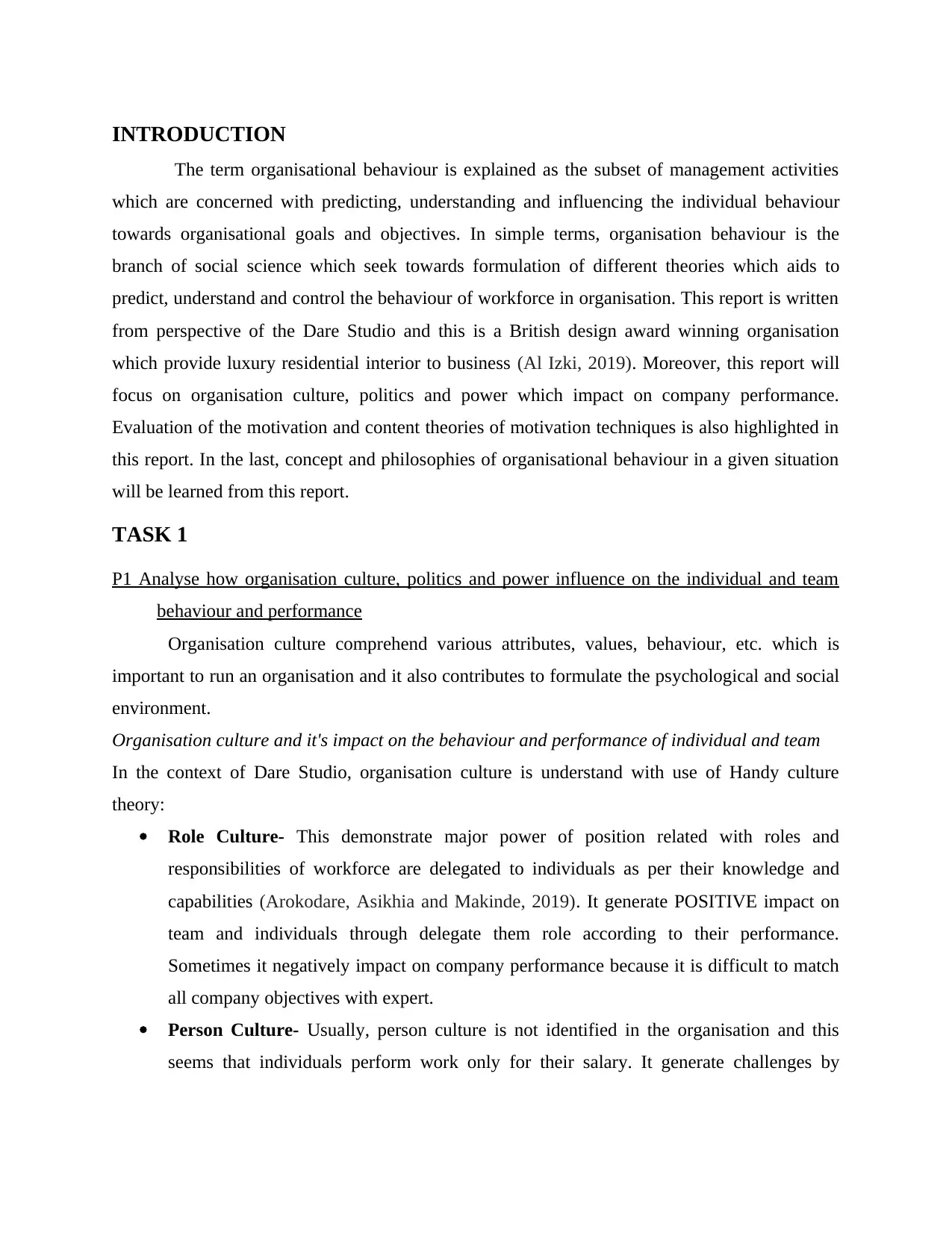
INTRODUCTION
The term organisational behaviour is explained as the subset of management activities
which are concerned with predicting, understanding and influencing the individual behaviour
towards organisational goals and objectives. In simple terms, organisation behaviour is the
branch of social science which seek towards formulation of different theories which aids to
predict, understand and control the behaviour of workforce in organisation. This report is written
from perspective of the Dare Studio and this is a British design award winning organisation
which provide luxury residential interior to business (Al Izki, 2019). Moreover, this report will
focus on organisation culture, politics and power which impact on company performance.
Evaluation of the motivation and content theories of motivation techniques is also highlighted in
this report. In the last, concept and philosophies of organisational behaviour in a given situation
will be learned from this report.
TASK 1
P1 Analyse how organisation culture, politics and power influence on the individual and team
behaviour and performance
Organisation culture comprehend various attributes, values, behaviour, etc. which is
important to run an organisation and it also contributes to formulate the psychological and social
environment.
Organisation culture and it's impact on the behaviour and performance of individual and team
In the context of Dare Studio, organisation culture is understand with use of Handy culture
theory:
Role Culture- This demonstrate major power of position related with roles and
responsibilities of workforce are delegated to individuals as per their knowledge and
capabilities (Arokodare, Asikhia and Makinde, 2019). It generate POSITIVE impact on
team and individuals through delegate them role according to their performance.
Sometimes it negatively impact on company performance because it is difficult to match
all company objectives with expert.
Person Culture- Usually, person culture is not identified in the organisation and this
seems that individuals perform work only for their salary. It generate challenges by
The term organisational behaviour is explained as the subset of management activities
which are concerned with predicting, understanding and influencing the individual behaviour
towards organisational goals and objectives. In simple terms, organisation behaviour is the
branch of social science which seek towards formulation of different theories which aids to
predict, understand and control the behaviour of workforce in organisation. This report is written
from perspective of the Dare Studio and this is a British design award winning organisation
which provide luxury residential interior to business (Al Izki, 2019). Moreover, this report will
focus on organisation culture, politics and power which impact on company performance.
Evaluation of the motivation and content theories of motivation techniques is also highlighted in
this report. In the last, concept and philosophies of organisational behaviour in a given situation
will be learned from this report.
TASK 1
P1 Analyse how organisation culture, politics and power influence on the individual and team
behaviour and performance
Organisation culture comprehend various attributes, values, behaviour, etc. which is
important to run an organisation and it also contributes to formulate the psychological and social
environment.
Organisation culture and it's impact on the behaviour and performance of individual and team
In the context of Dare Studio, organisation culture is understand with use of Handy culture
theory:
Role Culture- This demonstrate major power of position related with roles and
responsibilities of workforce are delegated to individuals as per their knowledge and
capabilities (Arokodare, Asikhia and Makinde, 2019). It generate POSITIVE impact on
team and individuals through delegate them role according to their performance.
Sometimes it negatively impact on company performance because it is difficult to match
all company objectives with expert.
Person Culture- Usually, person culture is not identified in the organisation and this
seems that individuals perform work only for their salary. It generate challenges by
Paraphrase This Document
Need a fresh take? Get an instant paraphrase of this document with our AI Paraphraser
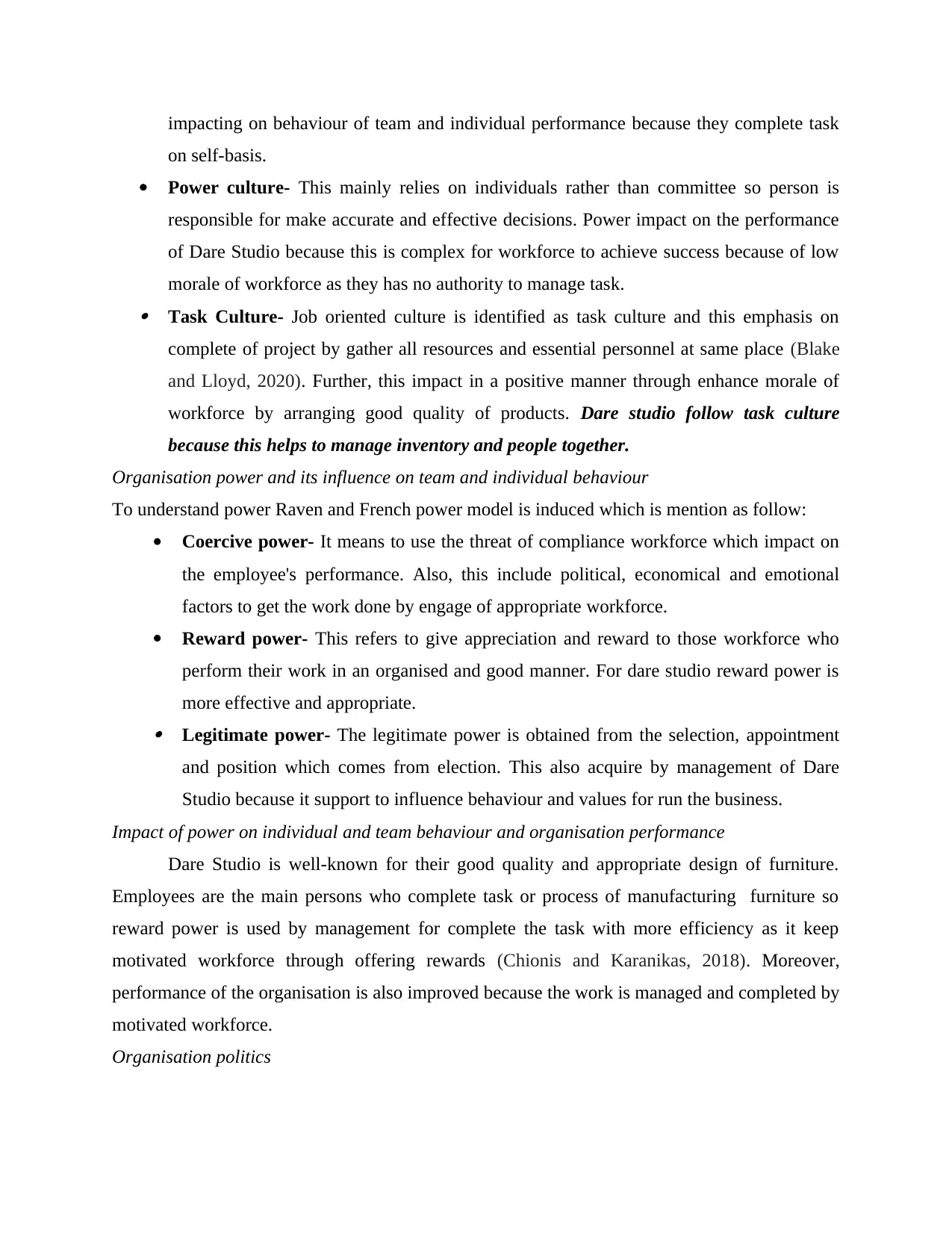
impacting on behaviour of team and individual performance because they complete task
on self-basis.
Power culture- This mainly relies on individuals rather than committee so person is
responsible for make accurate and effective decisions. Power impact on the performance
of Dare Studio because this is complex for workforce to achieve success because of low
morale of workforce as they has no authority to manage task. Task Culture- Job oriented culture is identified as task culture and this emphasis on
complete of project by gather all resources and essential personnel at same place (Blake
and Lloyd, 2020). Further, this impact in a positive manner through enhance morale of
workforce by arranging good quality of products. Dare studio follow task culture
because this helps to manage inventory and people together.
Organisation power and its influence on team and individual behaviour
To understand power Raven and French power model is induced which is mention as follow:
Coercive power- It means to use the threat of compliance workforce which impact on
the employee's performance. Also, this include political, economical and emotional
factors to get the work done by engage of appropriate workforce.
Reward power- This refers to give appreciation and reward to those workforce who
perform their work in an organised and good manner. For dare studio reward power is
more effective and appropriate. Legitimate power- The legitimate power is obtained from the selection, appointment
and position which comes from election. This also acquire by management of Dare
Studio because it support to influence behaviour and values for run the business.
Impact of power on individual and team behaviour and organisation performance
Dare Studio is well-known for their good quality and appropriate design of furniture.
Employees are the main persons who complete task or process of manufacturing furniture so
reward power is used by management for complete the task with more efficiency as it keep
motivated workforce through offering rewards (Chionis and Karanikas, 2018). Moreover,
performance of the organisation is also improved because the work is managed and completed by
motivated workforce.
Organisation politics
on self-basis.
Power culture- This mainly relies on individuals rather than committee so person is
responsible for make accurate and effective decisions. Power impact on the performance
of Dare Studio because this is complex for workforce to achieve success because of low
morale of workforce as they has no authority to manage task. Task Culture- Job oriented culture is identified as task culture and this emphasis on
complete of project by gather all resources and essential personnel at same place (Blake
and Lloyd, 2020). Further, this impact in a positive manner through enhance morale of
workforce by arranging good quality of products. Dare studio follow task culture
because this helps to manage inventory and people together.
Organisation power and its influence on team and individual behaviour
To understand power Raven and French power model is induced which is mention as follow:
Coercive power- It means to use the threat of compliance workforce which impact on
the employee's performance. Also, this include political, economical and emotional
factors to get the work done by engage of appropriate workforce.
Reward power- This refers to give appreciation and reward to those workforce who
perform their work in an organised and good manner. For dare studio reward power is
more effective and appropriate. Legitimate power- The legitimate power is obtained from the selection, appointment
and position which comes from election. This also acquire by management of Dare
Studio because it support to influence behaviour and values for run the business.
Impact of power on individual and team behaviour and organisation performance
Dare Studio is well-known for their good quality and appropriate design of furniture.
Employees are the main persons who complete task or process of manufacturing furniture so
reward power is used by management for complete the task with more efficiency as it keep
motivated workforce through offering rewards (Chionis and Karanikas, 2018). Moreover,
performance of the organisation is also improved because the work is managed and completed by
motivated workforce.
Organisation politics
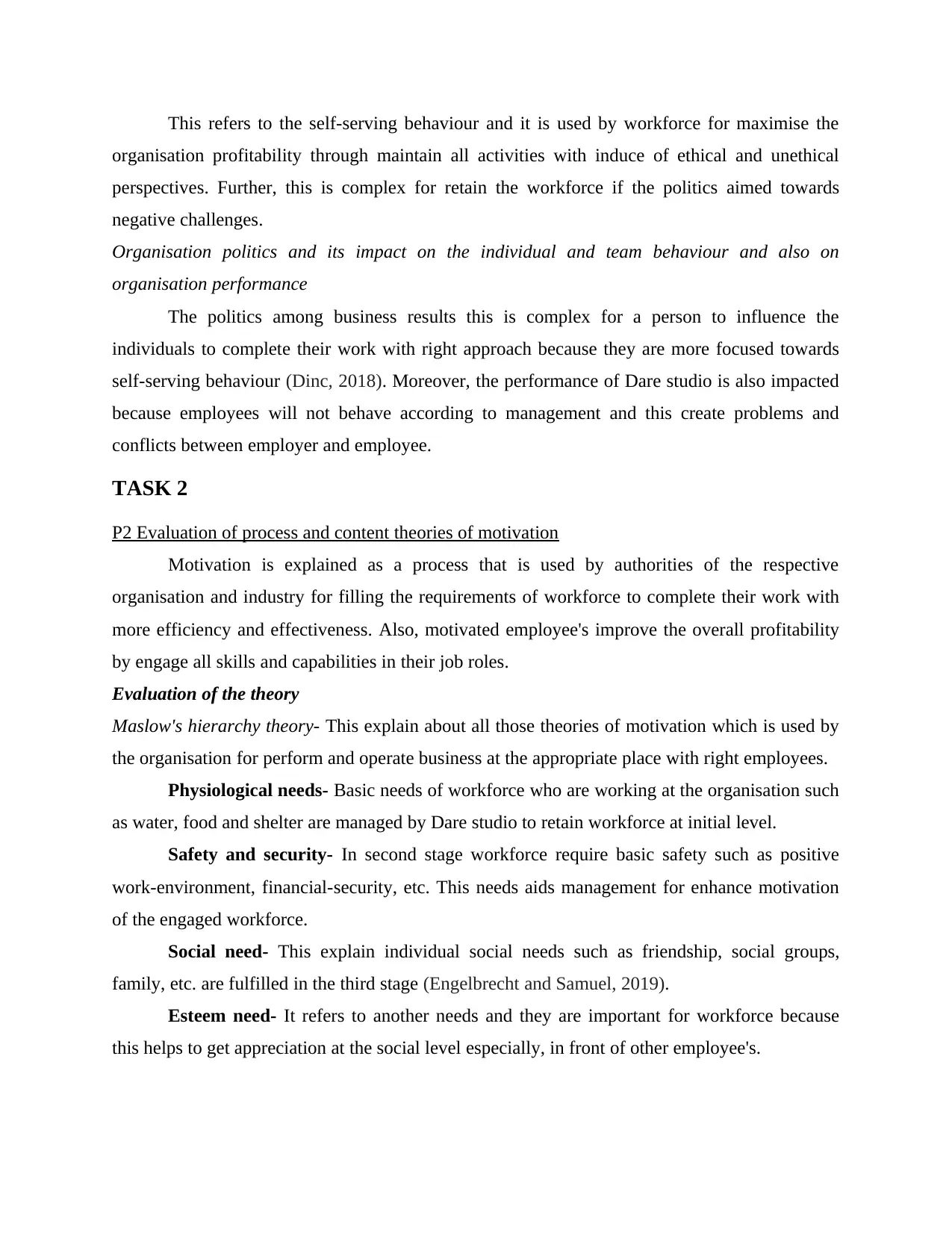
This refers to the self-serving behaviour and it is used by workforce for maximise the
organisation profitability through maintain all activities with induce of ethical and unethical
perspectives. Further, this is complex for retain the workforce if the politics aimed towards
negative challenges.
Organisation politics and its impact on the individual and team behaviour and also on
organisation performance
The politics among business results this is complex for a person to influence the
individuals to complete their work with right approach because they are more focused towards
self-serving behaviour (Dinc, 2018). Moreover, the performance of Dare studio is also impacted
because employees will not behave according to management and this create problems and
conflicts between employer and employee.
TASK 2
P2 Evaluation of process and content theories of motivation
Motivation is explained as a process that is used by authorities of the respective
organisation and industry for filling the requirements of workforce to complete their work with
more efficiency and effectiveness. Also, motivated employee's improve the overall profitability
by engage all skills and capabilities in their job roles.
Evaluation of the theory
Maslow's hierarchy theory- This explain about all those theories of motivation which is used by
the organisation for perform and operate business at the appropriate place with right employees.
Physiological needs- Basic needs of workforce who are working at the organisation such
as water, food and shelter are managed by Dare studio to retain workforce at initial level.
Safety and security- In second stage workforce require basic safety such as positive
work-environment, financial-security, etc. This needs aids management for enhance motivation
of the engaged workforce.
Social need- This explain individual social needs such as friendship, social groups,
family, etc. are fulfilled in the third stage (Engelbrecht and Samuel, 2019).
Esteem need- It refers to another needs and they are important for workforce because
this helps to get appreciation at the social level especially, in front of other employee's.
organisation profitability through maintain all activities with induce of ethical and unethical
perspectives. Further, this is complex for retain the workforce if the politics aimed towards
negative challenges.
Organisation politics and its impact on the individual and team behaviour and also on
organisation performance
The politics among business results this is complex for a person to influence the
individuals to complete their work with right approach because they are more focused towards
self-serving behaviour (Dinc, 2018). Moreover, the performance of Dare studio is also impacted
because employees will not behave according to management and this create problems and
conflicts between employer and employee.
TASK 2
P2 Evaluation of process and content theories of motivation
Motivation is explained as a process that is used by authorities of the respective
organisation and industry for filling the requirements of workforce to complete their work with
more efficiency and effectiveness. Also, motivated employee's improve the overall profitability
by engage all skills and capabilities in their job roles.
Evaluation of the theory
Maslow's hierarchy theory- This explain about all those theories of motivation which is used by
the organisation for perform and operate business at the appropriate place with right employees.
Physiological needs- Basic needs of workforce who are working at the organisation such
as water, food and shelter are managed by Dare studio to retain workforce at initial level.
Safety and security- In second stage workforce require basic safety such as positive
work-environment, financial-security, etc. This needs aids management for enhance motivation
of the engaged workforce.
Social need- This explain individual social needs such as friendship, social groups,
family, etc. are fulfilled in the third stage (Engelbrecht and Samuel, 2019).
Esteem need- It refers to another needs and they are important for workforce because
this helps to get appreciation at the social level especially, in front of other employee's.
⊘ This is a preview!⊘
Do you want full access?
Subscribe today to unlock all pages.

Trusted by 1+ million students worldwide
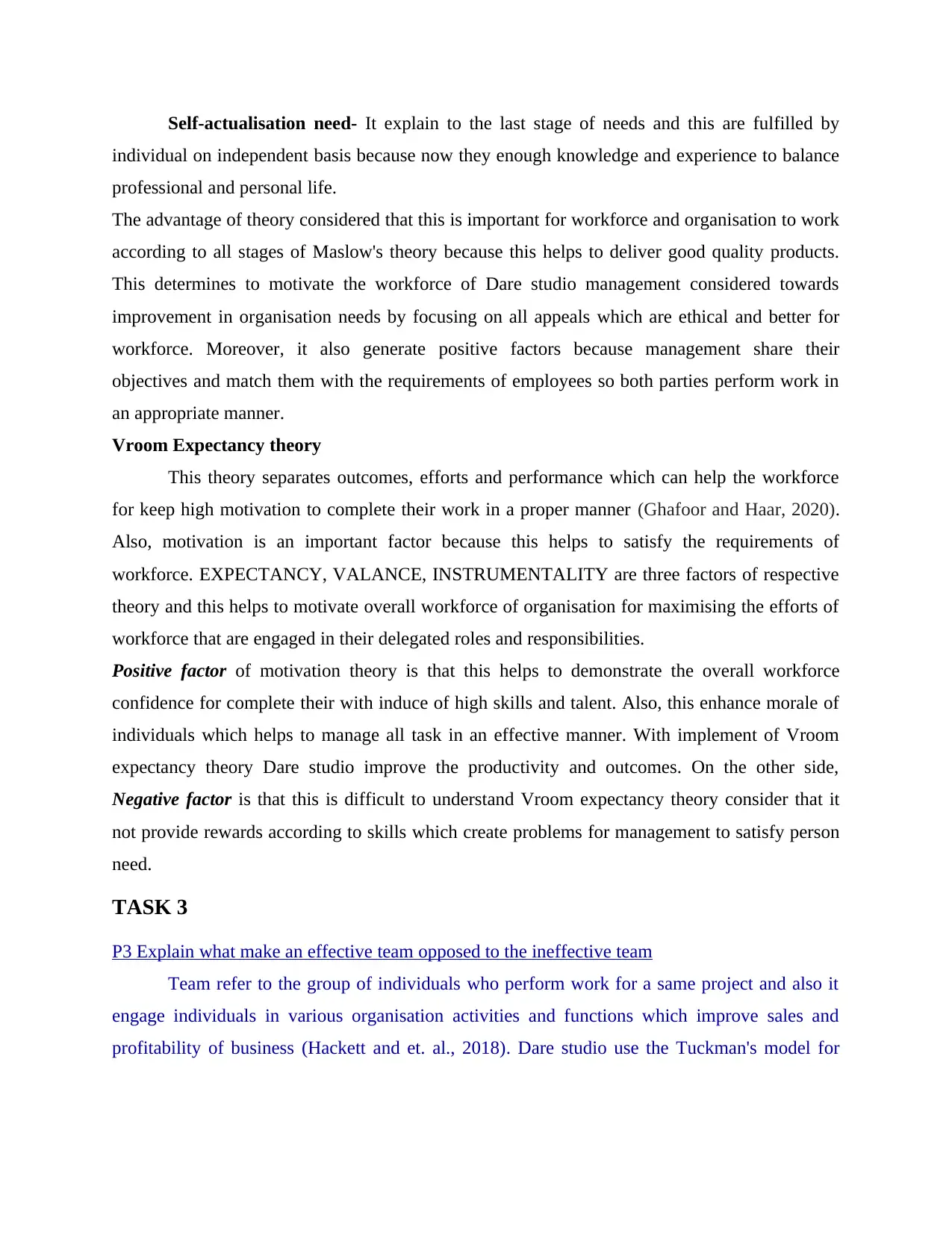
Self-actualisation need- It explain to the last stage of needs and this are fulfilled by
individual on independent basis because now they enough knowledge and experience to balance
professional and personal life.
The advantage of theory considered that this is important for workforce and organisation to work
according to all stages of Maslow's theory because this helps to deliver good quality products.
This determines to motivate the workforce of Dare studio management considered towards
improvement in organisation needs by focusing on all appeals which are ethical and better for
workforce. Moreover, it also generate positive factors because management share their
objectives and match them with the requirements of employees so both parties perform work in
an appropriate manner.
Vroom Expectancy theory
This theory separates outcomes, efforts and performance which can help the workforce
for keep high motivation to complete their work in a proper manner (Ghafoor and Haar, 2020).
Also, motivation is an important factor because this helps to satisfy the requirements of
workforce. EXPECTANCY, VALANCE, INSTRUMENTALITY are three factors of respective
theory and this helps to motivate overall workforce of organisation for maximising the efforts of
workforce that are engaged in their delegated roles and responsibilities.
Positive factor of motivation theory is that this helps to demonstrate the overall workforce
confidence for complete their with induce of high skills and talent. Also, this enhance morale of
individuals which helps to manage all task in an effective manner. With implement of Vroom
expectancy theory Dare studio improve the productivity and outcomes. On the other side,
Negative factor is that this is difficult to understand Vroom expectancy theory consider that it
not provide rewards according to skills which create problems for management to satisfy person
need.
TASK 3
P3 Explain what make an effective team opposed to the ineffective team
Team refer to the group of individuals who perform work for a same project and also it
engage individuals in various organisation activities and functions which improve sales and
profitability of business (Hackett and et. al., 2018). Dare studio use the Tuckman's model for
individual on independent basis because now they enough knowledge and experience to balance
professional and personal life.
The advantage of theory considered that this is important for workforce and organisation to work
according to all stages of Maslow's theory because this helps to deliver good quality products.
This determines to motivate the workforce of Dare studio management considered towards
improvement in organisation needs by focusing on all appeals which are ethical and better for
workforce. Moreover, it also generate positive factors because management share their
objectives and match them with the requirements of employees so both parties perform work in
an appropriate manner.
Vroom Expectancy theory
This theory separates outcomes, efforts and performance which can help the workforce
for keep high motivation to complete their work in a proper manner (Ghafoor and Haar, 2020).
Also, motivation is an important factor because this helps to satisfy the requirements of
workforce. EXPECTANCY, VALANCE, INSTRUMENTALITY are three factors of respective
theory and this helps to motivate overall workforce of organisation for maximising the efforts of
workforce that are engaged in their delegated roles and responsibilities.
Positive factor of motivation theory is that this helps to demonstrate the overall workforce
confidence for complete their with induce of high skills and talent. Also, this enhance morale of
individuals which helps to manage all task in an effective manner. With implement of Vroom
expectancy theory Dare studio improve the productivity and outcomes. On the other side,
Negative factor is that this is difficult to understand Vroom expectancy theory consider that it
not provide rewards according to skills which create problems for management to satisfy person
need.
TASK 3
P3 Explain what make an effective team opposed to the ineffective team
Team refer to the group of individuals who perform work for a same project and also it
engage individuals in various organisation activities and functions which improve sales and
profitability of business (Hackett and et. al., 2018). Dare studio use the Tuckman's model for
Paraphrase This Document
Need a fresh take? Get an instant paraphrase of this document with our AI Paraphraser
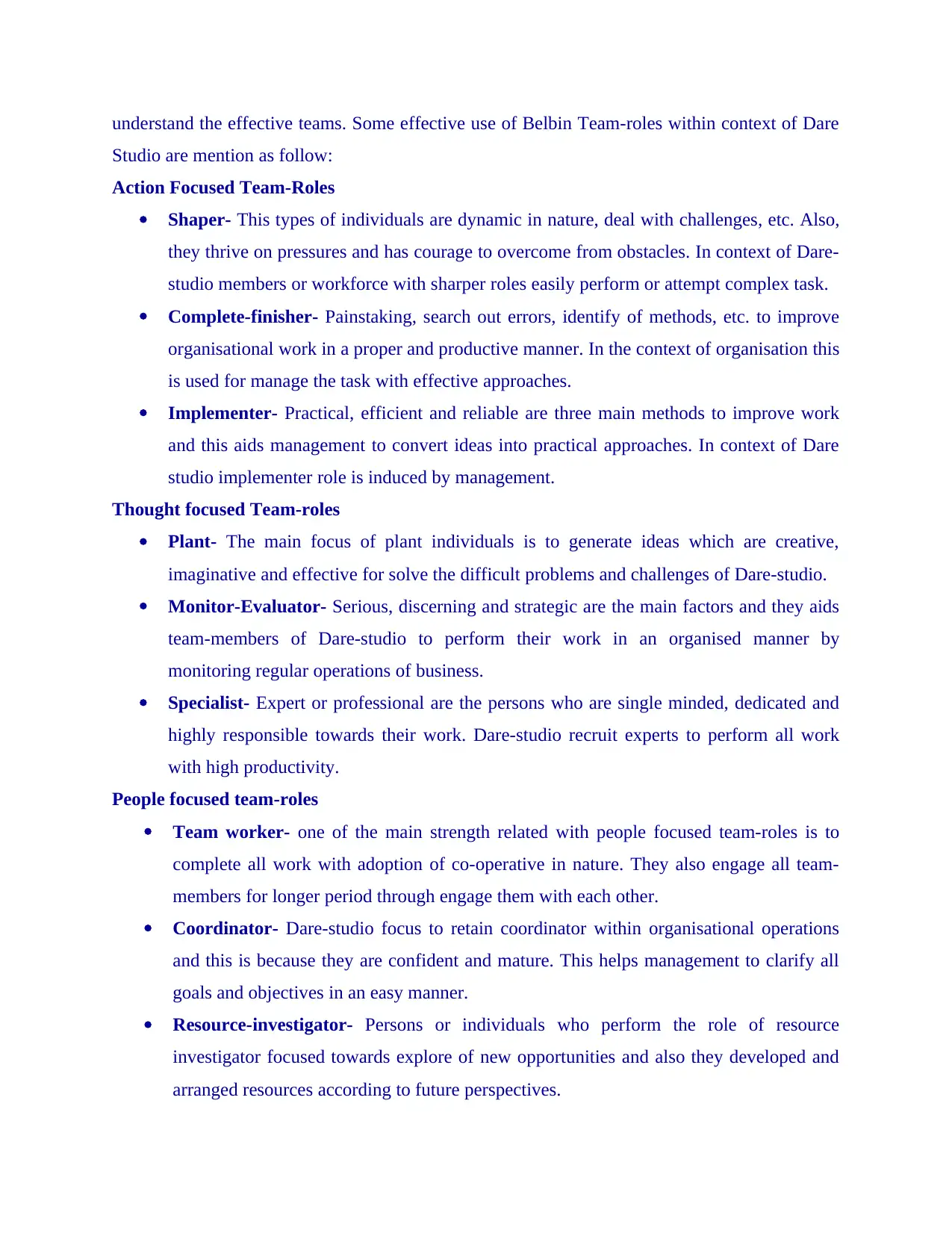
understand the effective teams. Some effective use of Belbin Team-roles within context of Dare
Studio are mention as follow:
Action Focused Team-Roles
Shaper- This types of individuals are dynamic in nature, deal with challenges, etc. Also,
they thrive on pressures and has courage to overcome from obstacles. In context of Dare-
studio members or workforce with sharper roles easily perform or attempt complex task.
Complete-finisher- Painstaking, search out errors, identify of methods, etc. to improve
organisational work in a proper and productive manner. In the context of organisation this
is used for manage the task with effective approaches.
Implementer- Practical, efficient and reliable are three main methods to improve work
and this aids management to convert ideas into practical approaches. In context of Dare
studio implementer role is induced by management.
Thought focused Team-roles
Plant- The main focus of plant individuals is to generate ideas which are creative,
imaginative and effective for solve the difficult problems and challenges of Dare-studio.
Monitor-Evaluator- Serious, discerning and strategic are the main factors and they aids
team-members of Dare-studio to perform their work in an organised manner by
monitoring regular operations of business.
Specialist- Expert or professional are the persons who are single minded, dedicated and
highly responsible towards their work. Dare-studio recruit experts to perform all work
with high productivity.
People focused team-roles
Team worker- one of the main strength related with people focused team-roles is to
complete all work with adoption of co-operative in nature. They also engage all team-
members for longer period through engage them with each other.
Coordinator- Dare-studio focus to retain coordinator within organisational operations
and this is because they are confident and mature. This helps management to clarify all
goals and objectives in an easy manner.
Resource-investigator- Persons or individuals who perform the role of resource
investigator focused towards explore of new opportunities and also they developed and
arranged resources according to future perspectives.
Studio are mention as follow:
Action Focused Team-Roles
Shaper- This types of individuals are dynamic in nature, deal with challenges, etc. Also,
they thrive on pressures and has courage to overcome from obstacles. In context of Dare-
studio members or workforce with sharper roles easily perform or attempt complex task.
Complete-finisher- Painstaking, search out errors, identify of methods, etc. to improve
organisational work in a proper and productive manner. In the context of organisation this
is used for manage the task with effective approaches.
Implementer- Practical, efficient and reliable are three main methods to improve work
and this aids management to convert ideas into practical approaches. In context of Dare
studio implementer role is induced by management.
Thought focused Team-roles
Plant- The main focus of plant individuals is to generate ideas which are creative,
imaginative and effective for solve the difficult problems and challenges of Dare-studio.
Monitor-Evaluator- Serious, discerning and strategic are the main factors and they aids
team-members of Dare-studio to perform their work in an organised manner by
monitoring regular operations of business.
Specialist- Expert or professional are the persons who are single minded, dedicated and
highly responsible towards their work. Dare-studio recruit experts to perform all work
with high productivity.
People focused team-roles
Team worker- one of the main strength related with people focused team-roles is to
complete all work with adoption of co-operative in nature. They also engage all team-
members for longer period through engage them with each other.
Coordinator- Dare-studio focus to retain coordinator within organisational operations
and this is because they are confident and mature. This helps management to clarify all
goals and objectives in an easy manner.
Resource-investigator- Persons or individuals who perform the role of resource
investigator focused towards explore of new opportunities and also they developed and
arranged resources according to future perspectives.
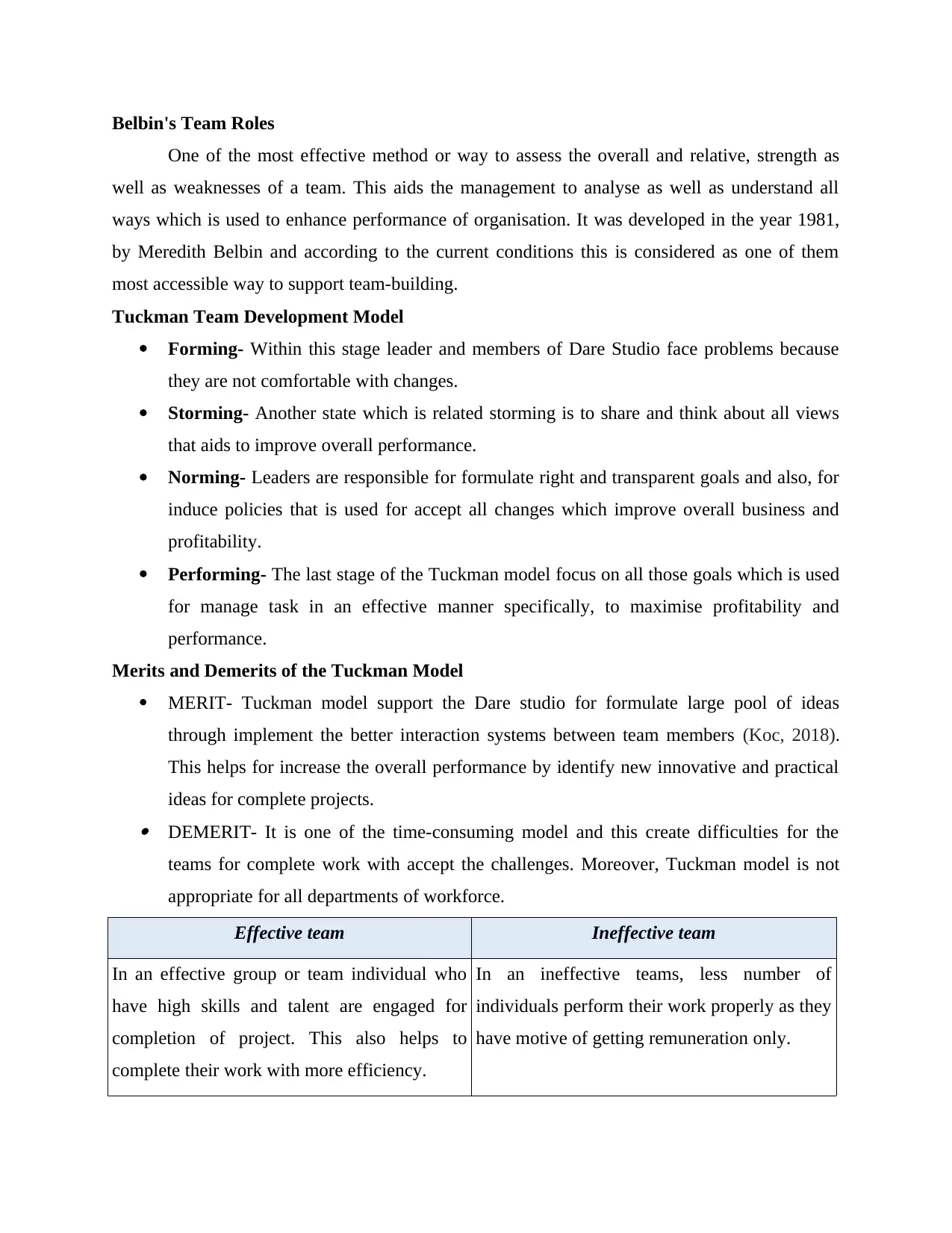
Belbin's Team Roles
One of the most effective method or way to assess the overall and relative, strength as
well as weaknesses of a team. This aids the management to analyse as well as understand all
ways which is used to enhance performance of organisation. It was developed in the year 1981,
by Meredith Belbin and according to the current conditions this is considered as one of them
most accessible way to support team-building.
Tuckman Team Development Model
Forming- Within this stage leader and members of Dare Studio face problems because
they are not comfortable with changes.
Storming- Another state which is related storming is to share and think about all views
that aids to improve overall performance.
Norming- Leaders are responsible for formulate right and transparent goals and also, for
induce policies that is used for accept all changes which improve overall business and
profitability.
Performing- The last stage of the Tuckman model focus on all those goals which is used
for manage task in an effective manner specifically, to maximise profitability and
performance.
Merits and Demerits of the Tuckman Model
MERIT- Tuckman model support the Dare studio for formulate large pool of ideas
through implement the better interaction systems between team members (Koc, 2018).
This helps for increase the overall performance by identify new innovative and practical
ideas for complete projects. DEMERIT- It is one of the time-consuming model and this create difficulties for the
teams for complete work with accept the challenges. Moreover, Tuckman model is not
appropriate for all departments of workforce.
Effective team Ineffective team
In an effective group or team individual who
have high skills and talent are engaged for
completion of project. This also helps to
complete their work with more efficiency.
In an ineffective teams, less number of
individuals perform their work properly as they
have motive of getting remuneration only.
One of the most effective method or way to assess the overall and relative, strength as
well as weaknesses of a team. This aids the management to analyse as well as understand all
ways which is used to enhance performance of organisation. It was developed in the year 1981,
by Meredith Belbin and according to the current conditions this is considered as one of them
most accessible way to support team-building.
Tuckman Team Development Model
Forming- Within this stage leader and members of Dare Studio face problems because
they are not comfortable with changes.
Storming- Another state which is related storming is to share and think about all views
that aids to improve overall performance.
Norming- Leaders are responsible for formulate right and transparent goals and also, for
induce policies that is used for accept all changes which improve overall business and
profitability.
Performing- The last stage of the Tuckman model focus on all those goals which is used
for manage task in an effective manner specifically, to maximise profitability and
performance.
Merits and Demerits of the Tuckman Model
MERIT- Tuckman model support the Dare studio for formulate large pool of ideas
through implement the better interaction systems between team members (Koc, 2018).
This helps for increase the overall performance by identify new innovative and practical
ideas for complete projects. DEMERIT- It is one of the time-consuming model and this create difficulties for the
teams for complete work with accept the challenges. Moreover, Tuckman model is not
appropriate for all departments of workforce.
Effective team Ineffective team
In an effective group or team individual who
have high skills and talent are engaged for
completion of project. This also helps to
complete their work with more efficiency.
In an ineffective teams, less number of
individuals perform their work properly as they
have motive of getting remuneration only.
⊘ This is a preview!⊘
Do you want full access?
Subscribe today to unlock all pages.

Trusted by 1+ million students worldwide
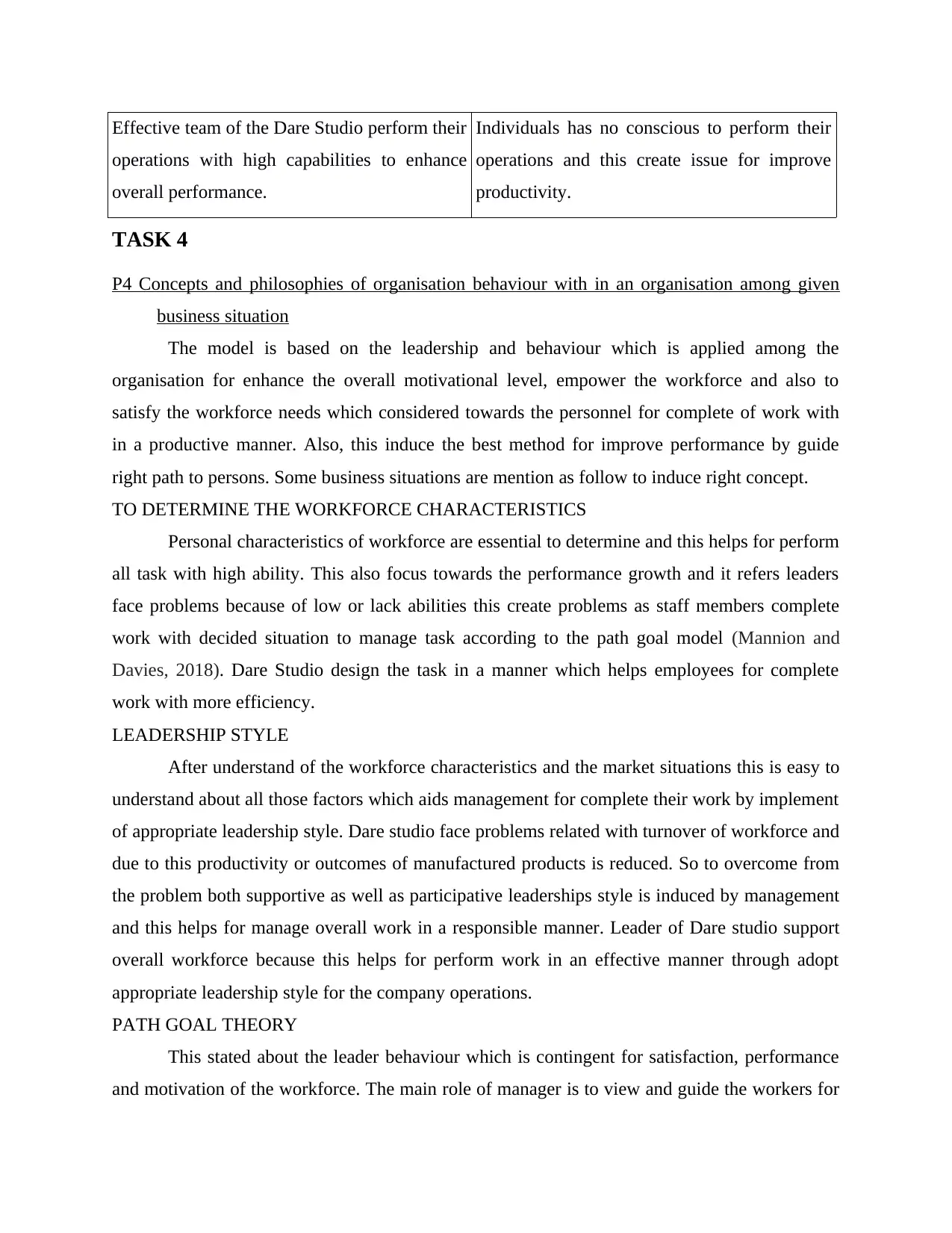
Effective team of the Dare Studio perform their
operations with high capabilities to enhance
overall performance.
Individuals has no conscious to perform their
operations and this create issue for improve
productivity.
TASK 4
P4 Concepts and philosophies of organisation behaviour with in an organisation among given
business situation
The model is based on the leadership and behaviour which is applied among the
organisation for enhance the overall motivational level, empower the workforce and also to
satisfy the workforce needs which considered towards the personnel for complete of work with
in a productive manner. Also, this induce the best method for improve performance by guide
right path to persons. Some business situations are mention as follow to induce right concept.
TO DETERMINE THE WORKFORCE CHARACTERISTICS
Personal characteristics of workforce are essential to determine and this helps for perform
all task with high ability. This also focus towards the performance growth and it refers leaders
face problems because of low or lack abilities this create problems as staff members complete
work with decided situation to manage task according to the path goal model (Mannion and
Davies, 2018). Dare Studio design the task in a manner which helps employees for complete
work with more efficiency.
LEADERSHIP STYLE
After understand of the workforce characteristics and the market situations this is easy to
understand about all those factors which aids management for complete their work by implement
of appropriate leadership style. Dare studio face problems related with turnover of workforce and
due to this productivity or outcomes of manufactured products is reduced. So to overcome from
the problem both supportive as well as participative leaderships style is induced by management
and this helps for manage overall work in a responsible manner. Leader of Dare studio support
overall workforce because this helps for perform work in an effective manner through adopt
appropriate leadership style for the company operations.
PATH GOAL THEORY
This stated about the leader behaviour which is contingent for satisfaction, performance
and motivation of the workforce. The main role of manager is to view and guide the workers for
operations with high capabilities to enhance
overall performance.
Individuals has no conscious to perform their
operations and this create issue for improve
productivity.
TASK 4
P4 Concepts and philosophies of organisation behaviour with in an organisation among given
business situation
The model is based on the leadership and behaviour which is applied among the
organisation for enhance the overall motivational level, empower the workforce and also to
satisfy the workforce needs which considered towards the personnel for complete of work with
in a productive manner. Also, this induce the best method for improve performance by guide
right path to persons. Some business situations are mention as follow to induce right concept.
TO DETERMINE THE WORKFORCE CHARACTERISTICS
Personal characteristics of workforce are essential to determine and this helps for perform
all task with high ability. This also focus towards the performance growth and it refers leaders
face problems because of low or lack abilities this create problems as staff members complete
work with decided situation to manage task according to the path goal model (Mannion and
Davies, 2018). Dare Studio design the task in a manner which helps employees for complete
work with more efficiency.
LEADERSHIP STYLE
After understand of the workforce characteristics and the market situations this is easy to
understand about all those factors which aids management for complete their work by implement
of appropriate leadership style. Dare studio face problems related with turnover of workforce and
due to this productivity or outcomes of manufactured products is reduced. So to overcome from
the problem both supportive as well as participative leaderships style is induced by management
and this helps for manage overall work in a responsible manner. Leader of Dare studio support
overall workforce because this helps for perform work in an effective manner through adopt
appropriate leadership style for the company operations.
PATH GOAL THEORY
This stated about the leader behaviour which is contingent for satisfaction, performance
and motivation of the workforce. The main role of manager is to view and guide the workers for
Paraphrase This Document
Need a fresh take? Get an instant paraphrase of this document with our AI Paraphraser
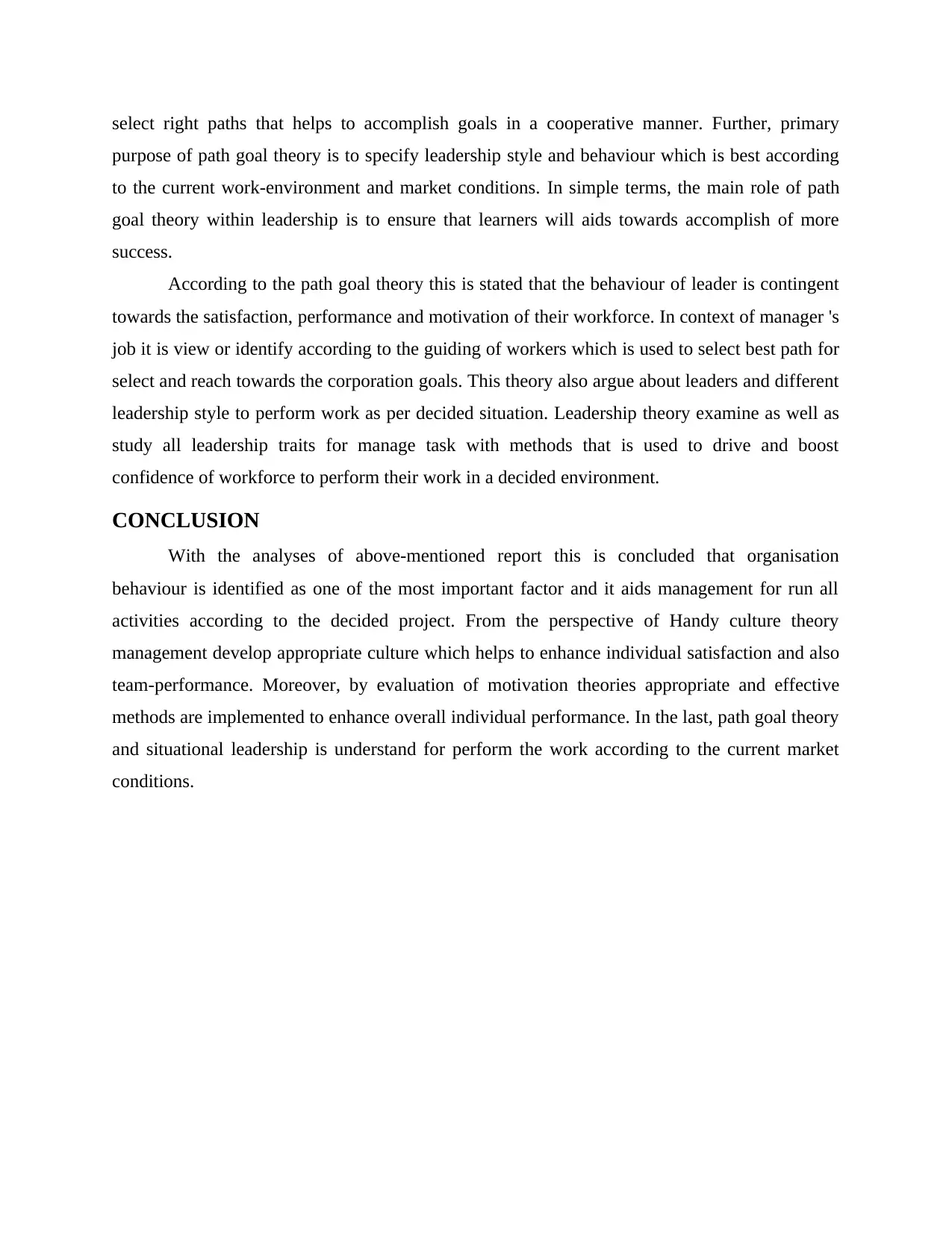
select right paths that helps to accomplish goals in a cooperative manner. Further, primary
purpose of path goal theory is to specify leadership style and behaviour which is best according
to the current work-environment and market conditions. In simple terms, the main role of path
goal theory within leadership is to ensure that learners will aids towards accomplish of more
success.
According to the path goal theory this is stated that the behaviour of leader is contingent
towards the satisfaction, performance and motivation of their workforce. In context of manager 's
job it is view or identify according to the guiding of workers which is used to select best path for
select and reach towards the corporation goals. This theory also argue about leaders and different
leadership style to perform work as per decided situation. Leadership theory examine as well as
study all leadership traits for manage task with methods that is used to drive and boost
confidence of workforce to perform their work in a decided environment.
CONCLUSION
With the analyses of above-mentioned report this is concluded that organisation
behaviour is identified as one of the most important factor and it aids management for run all
activities according to the decided project. From the perspective of Handy culture theory
management develop appropriate culture which helps to enhance individual satisfaction and also
team-performance. Moreover, by evaluation of motivation theories appropriate and effective
methods are implemented to enhance overall individual performance. In the last, path goal theory
and situational leadership is understand for perform the work according to the current market
conditions.
purpose of path goal theory is to specify leadership style and behaviour which is best according
to the current work-environment and market conditions. In simple terms, the main role of path
goal theory within leadership is to ensure that learners will aids towards accomplish of more
success.
According to the path goal theory this is stated that the behaviour of leader is contingent
towards the satisfaction, performance and motivation of their workforce. In context of manager 's
job it is view or identify according to the guiding of workers which is used to select best path for
select and reach towards the corporation goals. This theory also argue about leaders and different
leadership style to perform work as per decided situation. Leadership theory examine as well as
study all leadership traits for manage task with methods that is used to drive and boost
confidence of workforce to perform their work in a decided environment.
CONCLUSION
With the analyses of above-mentioned report this is concluded that organisation
behaviour is identified as one of the most important factor and it aids management for run all
activities according to the decided project. From the perspective of Handy culture theory
management develop appropriate culture which helps to enhance individual satisfaction and also
team-performance. Moreover, by evaluation of motivation theories appropriate and effective
methods are implemented to enhance overall individual performance. In the last, path goal theory
and situational leadership is understand for perform the work according to the current market
conditions.
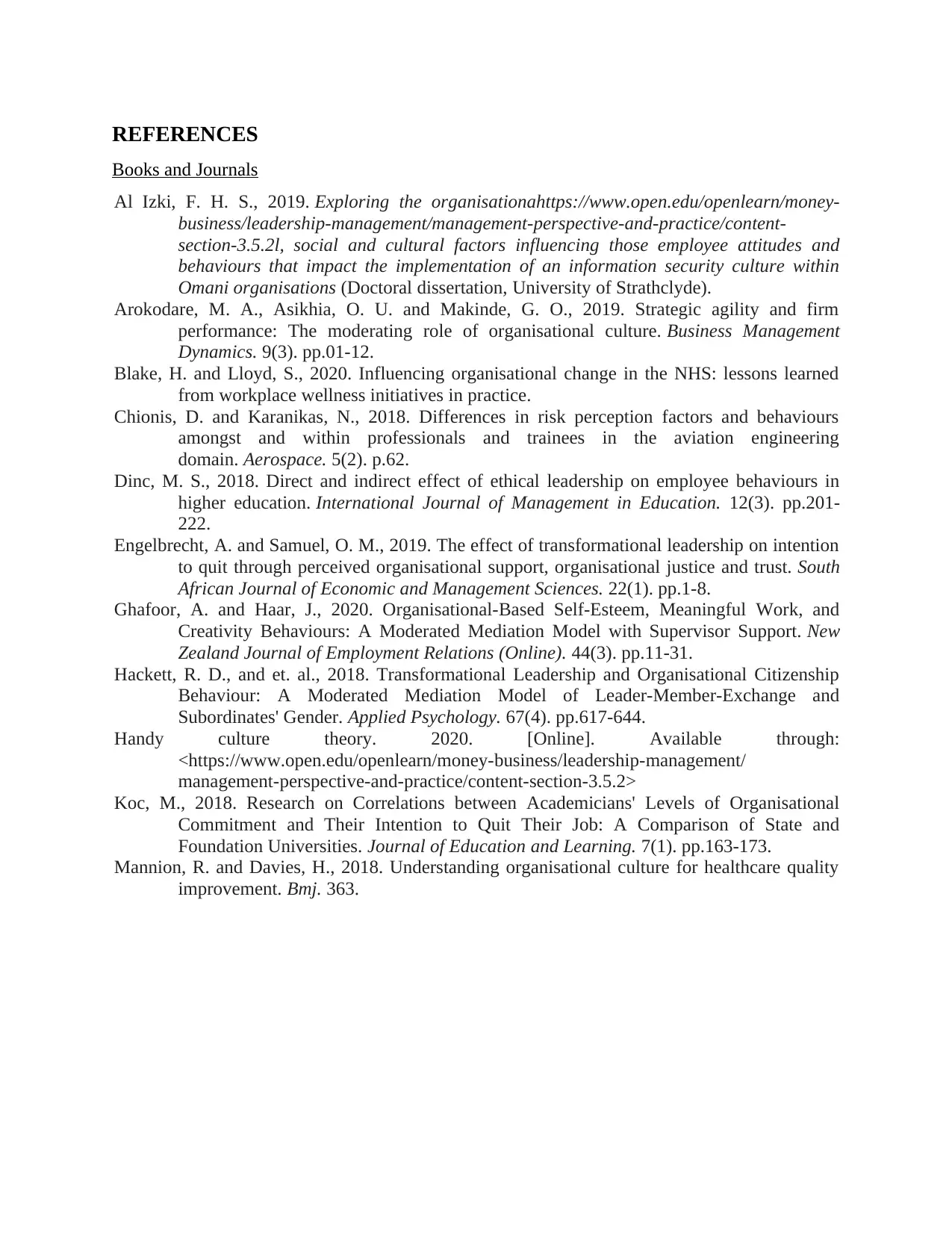
REFERENCES
Books and Journals
Al Izki, F. H. S., 2019. Exploring the organisationahttps://www.open.edu/openlearn/money-
business/leadership-management/management-perspective-and-practice/content-
section-3.5.2l, social and cultural factors influencing those employee attitudes and
behaviours that impact the implementation of an information security culture within
Omani organisations (Doctoral dissertation, University of Strathclyde).
Arokodare, M. A., Asikhia, O. U. and Makinde, G. O., 2019. Strategic agility and firm
performance: The moderating role of organisational culture. Business Management
Dynamics. 9(3). pp.01-12.
Blake, H. and Lloyd, S., 2020. Influencing organisational change in the NHS: lessons learned
from workplace wellness initiatives in practice.
Chionis, D. and Karanikas, N., 2018. Differences in risk perception factors and behaviours
amongst and within professionals and trainees in the aviation engineering
domain. Aerospace. 5(2). p.62.
Dinc, M. S., 2018. Direct and indirect effect of ethical leadership on employee behaviours in
higher education. International Journal of Management in Education. 12(3). pp.201-
222.
Engelbrecht, A. and Samuel, O. M., 2019. The effect of transformational leadership on intention
to quit through perceived organisational support, organisational justice and trust. South
African Journal of Economic and Management Sciences. 22(1). pp.1-8.
Ghafoor, A. and Haar, J., 2020. Organisational-Based Self-Esteem, Meaningful Work, and
Creativity Behaviours: A Moderated Mediation Model with Supervisor Support. New
Zealand Journal of Employment Relations (Online). 44(3). pp.11-31.
Hackett, R. D., and et. al., 2018. Transformational Leadership and Organisational Citizenship
Behaviour: A Moderated Mediation Model of Leader‐Member‐Exchange and
Subordinates' Gender. Applied Psychology. 67(4). pp.617-644.
Handy culture theory. 2020. [Online]. Available through:
<https://www.open.edu/openlearn/money-business/leadership-management/
management-perspective-and-practice/content-section-3.5.2>
Koc, M., 2018. Research on Correlations between Academicians' Levels of Organisational
Commitment and Their Intention to Quit Their Job: A Comparison of State and
Foundation Universities. Journal of Education and Learning. 7(1). pp.163-173.
Mannion, R. and Davies, H., 2018. Understanding organisational culture for healthcare quality
improvement. Bmj. 363.
Books and Journals
Al Izki, F. H. S., 2019. Exploring the organisationahttps://www.open.edu/openlearn/money-
business/leadership-management/management-perspective-and-practice/content-
section-3.5.2l, social and cultural factors influencing those employee attitudes and
behaviours that impact the implementation of an information security culture within
Omani organisations (Doctoral dissertation, University of Strathclyde).
Arokodare, M. A., Asikhia, O. U. and Makinde, G. O., 2019. Strategic agility and firm
performance: The moderating role of organisational culture. Business Management
Dynamics. 9(3). pp.01-12.
Blake, H. and Lloyd, S., 2020. Influencing organisational change in the NHS: lessons learned
from workplace wellness initiatives in practice.
Chionis, D. and Karanikas, N., 2018. Differences in risk perception factors and behaviours
amongst and within professionals and trainees in the aviation engineering
domain. Aerospace. 5(2). p.62.
Dinc, M. S., 2018. Direct and indirect effect of ethical leadership on employee behaviours in
higher education. International Journal of Management in Education. 12(3). pp.201-
222.
Engelbrecht, A. and Samuel, O. M., 2019. The effect of transformational leadership on intention
to quit through perceived organisational support, organisational justice and trust. South
African Journal of Economic and Management Sciences. 22(1). pp.1-8.
Ghafoor, A. and Haar, J., 2020. Organisational-Based Self-Esteem, Meaningful Work, and
Creativity Behaviours: A Moderated Mediation Model with Supervisor Support. New
Zealand Journal of Employment Relations (Online). 44(3). pp.11-31.
Hackett, R. D., and et. al., 2018. Transformational Leadership and Organisational Citizenship
Behaviour: A Moderated Mediation Model of Leader‐Member‐Exchange and
Subordinates' Gender. Applied Psychology. 67(4). pp.617-644.
Handy culture theory. 2020. [Online]. Available through:
<https://www.open.edu/openlearn/money-business/leadership-management/
management-perspective-and-practice/content-section-3.5.2>
Koc, M., 2018. Research on Correlations between Academicians' Levels of Organisational
Commitment and Their Intention to Quit Their Job: A Comparison of State and
Foundation Universities. Journal of Education and Learning. 7(1). pp.163-173.
Mannion, R. and Davies, H., 2018. Understanding organisational culture for healthcare quality
improvement. Bmj. 363.
⊘ This is a preview!⊘
Do you want full access?
Subscribe today to unlock all pages.

Trusted by 1+ million students worldwide
1 out of 13
Related Documents
Your All-in-One AI-Powered Toolkit for Academic Success.
+13062052269
info@desklib.com
Available 24*7 on WhatsApp / Email
![[object Object]](/_next/static/media/star-bottom.7253800d.svg)
Unlock your academic potential
Copyright © 2020–2025 A2Z Services. All Rights Reserved. Developed and managed by ZUCOL.





